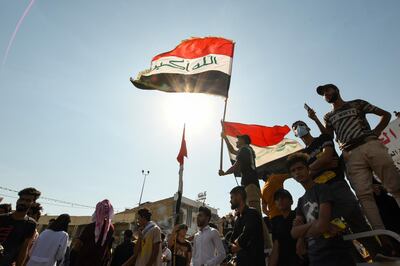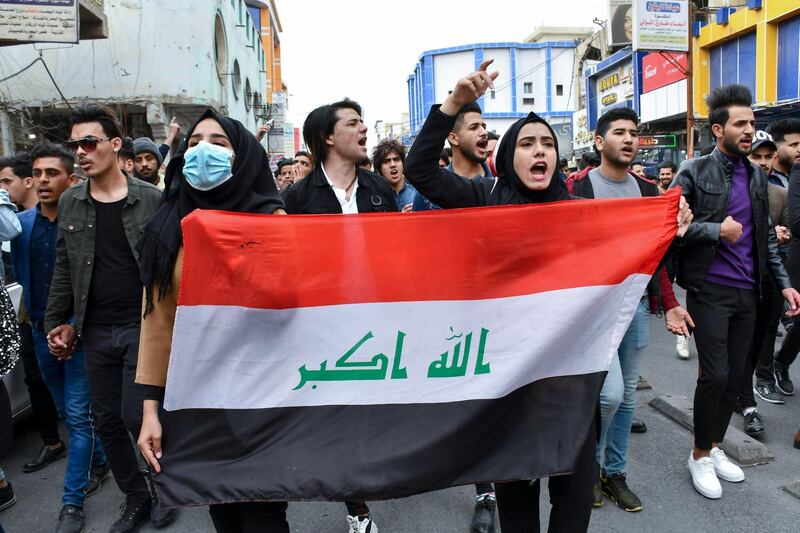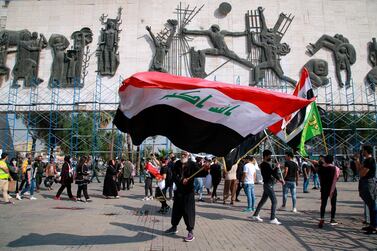At least five people were shot dead and dozens wounded in Iraq's southern city of Nasiriyah during clashes between anti-government protesters and supporters of the populist cleric Moqtada Al Sadr, medics said.
The clashes broke out as thousands of Mr Al Sadr's supporters flooded the streets of Baghdad and Nasiriyah on Friday in a show of force ahead of parliamentary elections in June.
There were conflicting accounts of the events leading up to the clashes in Nasiriyah. According to a witnesses who spoke to Reuters, followers of Mr Al Sadr carrying pictures of the cleric marched to the city's central Al Haboubi square, where anti-government protesters have held a sit-in since 2019, after Friday prayers.
They fired gunshots and threw petrol bombs at the protesters' tents, leading the protesters to fight back, the witness said.
According to medical officials in Nasiriyah who spoke to the Associated Press, the violence broke out when protesters attempted to block the march by the Sadrists, who were responding to a call for a show of strength by their leader ahead of early elections next year.
Anti-government protesters feel betrayed by Mr Al Sadr, who leads a powerful political bloc in parliament. The cleric initially backed the protest movement that began in October last year but later withdrew his support.
Prime Minister Mustafa Al Kadhimi called for the polls in June – nearly a year ahead of schedule – to fulfil a key demand of protest movement.

Mohammad Al Khayyat, a leader of the anti-government movement, said the cleric's followers attacked the protesters tent camp in Al Haboubi square on Friday. "Sadrists armed with guns and pistols came to try to clear our tents. We fear that more violence could take place," he told AFP.
"The security forces clearly failed to prevent armed gangs from storming Habboubi Square," wrote Asaad Al Naseri, an ex-Sadrist based in Nasiriyah.
Nasiriyah was a major hub for the anti-government protest movement that erupted in October 2019.
It was also the site of one of the bloodiest incidents of the uprising nearly one year ago on November 28, when more than three dozen died in protest-related violence.
The deaths sparked outrage across Iraq, including by the country's top Shiite authority Grand Ayatollah Ali Sistani, and prompted the resignation of then prime minister Adel Abdel Mahdi.
Mr Kadhimi's plan to hold early elections is seen as an effort to reach out to protesters.
The polls will take place under a new electoral law agreed by parliament that will see district sizes reduced and votes for individual candidates replacing list-based ballots.
Most observers expect a delay of at least a few months while political parties prepare their campaigns, but experts say the new system is likely to benefit Mr Al Sadr and his candidates.
Sadrists already won big in the May 2018 vote, with 54 of parliament's 329 seats, granting him the biggest single bloc.
In a tweet this week, Mr Al Sadr said he expected major wins in the new elections and would push for the next prime minister to be a member of his movement for the first time.
He also called for the demonstrations on Friday, prompting tens of thousands to turn out in Baghdad and in other Iraqi cities including Al Hillah and Basra in the south.
Despite the Covid-19 pandemic, they gathered shoulder-to-shoulder for noon prayers in Baghdad's Tahrir Square, spilling out into the surrounding streets.
In a sermon read out by the cleric's representative, the firebrand leader called for a "Sadrist majority" in parliament.
Mr Al Sadr is very rarely seen in public and did not attend the rally.
"This is a protest against the corrupt, the oppressors, who have driven Iraq to brink of bankruptcy, to the brink of the abyss," said Talal Al Saadi, a cleric who was among those protesting on Friday.
Iraq is facing its most dire fiscal crisis in decades following a collapse in oil prices earlier this year and the economic effects of the Covid-19 pandemic, with the government unable to pay public sector salaries on time.
On Friday, Mr Sadr's supporters carried Iraq's national tricolour and posters of the cleric, including some that evoked his past as a militia leader and showed him in camouflage.
Volunteers dressed in light blue – the movement's colour – sprayed the crowd with disinfectant.
"Obeying Sadr's call, we're making a stand that the whole world will see – we don't want criminals or corrupt people in Iraq," said protester Ahmad Rahim, with an Iraqi flag draped around his shoulders.
"We call the shots," he said.







